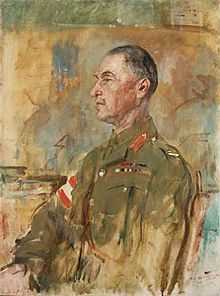Cameron Shute
| Sir Cameron Shute | |
|---|---|
 General Sir Cameron Shute | |
| Born | 1866 |
| Died | 1936 (aged 69 or 70) |
| Allegiance |
|
| Service/branch |
|
| Rank | General |
| Unit | World War I |
| Commands held |
2nd Bn the Rifle Brigade 59th Brigade Royal Naval Division 32nd Division 19th Division V Corps 4th Division Northern Command |
| Awards |
Knight Commander of the Order of the Bath Knight Commander of the Order of St Michael and St George |
General Sir Cameron Deane Shute KCB KCMG (1866–1936) was a British Army General during World War I.
Military career
Shute was commissioned into the Welsh Regiment in 1885.[1] He transferred to the Rifle Brigade in 1895 and participated in the Nile Expedition and the Siege of Khartoum in 1898.[1] He was Deputy Assistant Adjutant General in Malta from 1899 and a General Staff Officer at Scottish Coast Defences from 1905.[1] In 1910 he was appointed Commander of the 2nd Bn the Rifle Brigade and then became a General Staff Officer at Aldershot Training Centre from 1914.[1]
He served in World War I in France and Belgium becoming Commander of 59th Brigade in France during the Guillemont actions in 1915.[2] He went on to be General Officer Commanding of the Royal Naval Division in 1916, of the 32nd Division in 1917 and of the 19th Division at the Battle of Messines in France in 1917.[1] In April 1918 he took command of V Corps in France.[1]
After the War he became GOC of 4th Division.[1] Finally he was General Officer Commanding-in-Chief for Northern Command in 1927; he retired in 1931.[1]
A.P. Herbert poem
General Shute had an intense dislike for the unconventional "nautical" traditions of the Royal Naval Division and made numerous unpopular attempts to stamp them out. He was particularly critical of the poor management of the latrines which could have led to an outbreak of dysentery.[3] Following a particularly critical inspection of the trenches by General Shute, an officer of the division, Sub-Lieutenant A. P. Herbert, who later became a famous humorous writer, legal satirist and Member of Parliament, wrote a popular poem that summed up the feelings of the men of the RND:[4]
The General inspecting the trenches
Exclaimed with a horrified shout
'I refuse to command a division
Which leaves its excreta about.'But nobody took any notice
No one was prepared to refute,
That the presence of shit was congenial
Compared to the presence of Shute.And certain responsible critics
Made haste to reply to his words
Observing that his staff advisors
Consisted entirely of turds.For shit may be shot at odd corners
And paper supplied there to suit,
But a shit would be shot without mourners
If somebody shot that shit Shute.
Although soldier songs hostile to superior officers were not rare, it is unusual to have a song aimed at a named officer.
References
- ↑ 1.0 1.1 1.2 1.3 1.4 1.5 1.6 1.7 Liddell Hart Centre for Military Archives
- ↑ Battlefields
- ↑ Gordon Corrigan Mud, Blood and Poppycock (ISBN 0304359556) p87-88
- ↑ Martin Gilbert, The Somme, Henry Holt, 2006, p218
| Military offices | ||
|---|---|---|
| Preceded by Edward Fanshawe |
GOC V Corps 1918–1919 |
Succeeded by Post Disbanded |
| Preceded by Cuthbert Lucas |
General Officer Commanding the 4th Division 1919–1923 |
Succeeded by Reginald Stephens |
| Preceded by Sir Charles Harington |
GOC-in-C Northern Command 1927–1931 |
Succeeded by Sir John Gathorne-Hardy |